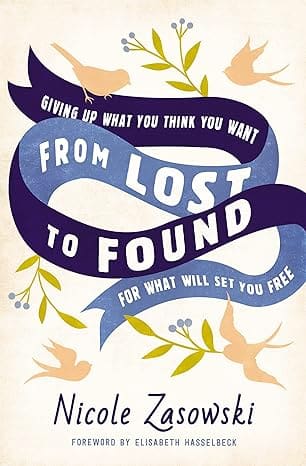- Home
- Spiritual Life
- When You’re Called: Losing Approval

When You’re Called: Losing Approval
 Excerpt taken from From Lost to Found: Giving Up What You Think You Want for What Will Set You Free by Nicole Zasowski
Excerpt taken from From Lost to Found: Giving Up What You Think You Want for What Will Set You Free by Nicole Zasowski
Chapter 4
When You’re Called
Losing Approval
Perhaps only when human effort has done its best and failed, would God’s power alone be free to work.
— Corrie ten Boom
I felt my hands shaking as I struggled with the clasp of my necklace. I was anxious about my 11:00 a.m. coffee appointment and felt it would help to look like a young lady who was from the East Coast. Or at the very least like a young lady who knew what the East Coast expected of her. The string of pearls my parents had given me for my eleventh birthday seemed appropriate.
I stood in front of the mirror, pressing my floral sundress smooth with my sweaty palms, my hands pausing over my belly— still flat after months of trying to conceive. I felt like the only woman in Fairfield County who did not want a flat stomach. I fluffed my hair awake in spite of the humidity, my pulse racing. An acquaintance from my neighborhood back in Seattle had offered to connect me with a therapist she knew in the nearby town of Westport. The woman was the director of a group private practice, and she happened to be looking for a therapist to fill an opening she had on her staff.
The job appeared to be similar to the one I had left behind in California and was everything I hoped to find here in Connecticut. The woman had invited me to her home for a conversation over coffee. The conversation was not meant to be an interview, but I was nervous nonetheless. I wanted this time together to go well and was hoping this coffee hour would lead to an unofficial job offer. But more than that, I was hoping she would hear my story and believe in me. I longed for this woman to really see me— my personality, my heart, my vision, my mission— and I wanted her to love what she saw and be willing to fight for me. I guess I was looking for the approval of someone I deemed important and successful. Maybe she could give me the confidence that I, too, was important and had what it took to be successful in Fairfield County.
I pulled the idea around me like a protective blanket. I could feel like I’m enough with this woman’s approval on my side. But like anything we do in pain, it would fail.
We all carry different feelings to events like interviews and first days. You and I might show up to the same situation and experience completely different feelings because of our different stories. For me, my personal worth and performance felt like one in the same. A lack of approval would be a threat to my value. My deep need to impress this woman was driven by my feelings of insignificance or being ordinary. A flawless performance was my shield against my constant fear of being average.
I left for the therapist’s house egregiously early, accounting for any potential disaster that might hinder me on the ten-minute commute. On the way, I stopped at the only florist I could find in town, where I traded what felt like most of my savings account for a modest bouquet of flowers. The positive first impression would be worth it.
Not surprisingly, I arrived approximately forty-five minutes early. Like an amateur burglar, I parked inconspicuously down the street in front of a stately gated home, turning the car on and off and lifting my butt in the air to avoid sticking to the leather seats in the thick August heat. When 11:00 a.m. finally came, I knocked on the bright red door of the woman’s enormous white colonial style home, clutching my fragrant savings account with a tight fist of eagerness and silently rehearsing answers to the questions I anticipated she would ask me.
After a few heart-pounding seconds, the door flung open and the woman ushered me into her sitting room. She spoke in short, rapid sentences as she whirled around the kitchen, pulling mugs and small china plates from her cabinets, pausing just long enough to abruptly ask me how I took my coffee. I didn’t really have an interest in coffee at the moment, but I answered anyway, not wanting to risk acceptance by declining her beverage of choice.
“Black,” I said, because it seemed like the easiest answer — a choice that was much bolder than I felt in that moment.
I glanced around the opulently decorated room. Everything looked expensive and fragile. Long silk curtains draped and pooled luxuriously on the ornate rug. Collections of intricately painted vases were arranged neatly on the mantel. And large, framed photos of an African safari told the story of a well-traveled life.
Once refreshments were set out and pleasantries were exchanged, we settled into the cushions of her sitting room couch. Settling into conversation proved to be more difficult. I felt more like a witness on the stand than a guest. I continued to take sips of my bitter, black coffee, despite the fact that it made me want to gag, just to buy more time to form responses to her rapid-fire questions.
“What credentials and certifications do you have?”
“Why did you become a therapist when you were so young?”
I did my best to formulate answers that would satisfy her. But as I searched her face for some affirmation or connection, I was met with pursed lips and raised eyebrows, signaling my failure to prove myself worthy of a job and maybe even of sitting in her company. I knew my end of the conversation was falling flat. But nothing could have prepared me for the blow I received when she interrupted me with, “I mean, all people are going to see when they look at you is a little girl who isn’t worth listening to.”
I have no idea how much time passed in the moment of silence that followed. I willed tears back as shame washed over me. I could feel my lips curl into a smile, but I felt certain my eyes weren’t playing along. I had to remind my body to do things that it was supposed to be doing automatically, like breathing and blinking.
Her statement felt like a rock wrapped in velvet. The hurtful words were packaged with a gentle voice and a smile, but her proclamation slammed into the core of my identity. I had shared everything with her. She held my story, my experience, and my dreams, and all I could do was watch her squeeze them and shape them in ways that made me feel unworthy and exposed. Her words felt true by the power of her own say-so.
I caught a glimpse of myself in the antique gilded mirror hanging above the fireplace. I saw a little girl playing dress up, sitting on a grown-up’s couch. I had a feeling this woman saw me exactly the same way. I felt powerless to do or say anything that would convince her to see me for who I was or feel differently about what she saw. I had given our conversation my very best, and it was not enough. My hopes vanished.
Certainly I felt disappointed that she did not offer me a job. Of course being rejected this time made me fearful that this was the first of many rejections to come. But her words touched a deeper fear — a wound, really. At my core I was afraid I was inadequate for the call I felt God placing on my life.
Apart from being female in a female-dominated field, there was nothing about me that fit the picture of a “New England therapist” that most people held in their minds. My observations led me to believe that counseling was commonly pursued as a second career, whereas marriage and family therapy was a vocation I felt called to immediately after completing my education. I lacked life experience that naturally comes with age. I was naïve to the greater New York metropolitan area culture, while most of the therapists I encountered were native to the area. And there was absolutely nothing I could do to change these facts. I felt that having all the right credentials and experience, the perfect image, and the admiration of others would give me the confidence that this call made sense for my life. Instead, I realized I had no hard evidence to support my claim that God had called me to counseling. I began to doubt that God wanted me to be a therapist at all.
Sure, I was tenderhearted and compassionate. People had called me wise my whole life, and they don’t call me “old-soul Nicole” for nothing. But could God’s call be enough for my shortcomings?
I also felt unsettled by the fact that I had barely known this woman an hour and it felt like she had the power to measure my worth. The problem with performing for our significance is that we place a tremendous amount of stock in the opinions of others. We depend on outside affirmation to answer our feelings regardless of whether the people we seek it from are trusted voices in our lives. This woman’s opinion mattered a great deal to me, even to the extent that my whole identity seemed to hinge on her approval. Because I thought of her as a “somebody,” her lack of approval made me feel like a nobody.
Somehow I managed to politely end the conversation, get up off the woman’s couch, and find my way back to the red door. She thanked me for the flowers, and before I could reply, I heard the door click behind me. Why did I feel as though a part of me were still stuck inside?
A thunderstorm had rolled in during our conversation, and it was now pouring rain. I found this to be strangely comforting — the perfect backdrop for my misery. Accepting this new definition of myself as true, I made my way back to our carriage house, feeling small and rejected.
The problem with medicating our pain with performance is that we are only as valuable as our last accomplishment. In my experience, performing well might feel good in the moment, but part of you will live in fear that you will fall off the pedestal. Even a job well done cannot bring peace, because it simply creates another opportunity to prove that you can do it again. Like anything we do in reaction to our pain, performance leads us back to the very feelings we were trying to avoid in the first place. On the other hand, if we fail to please, our worst fears are confirmed. In this case, if you are like me, you will likely decide that you are indeed insignificant and ordinary.
When I feel this way, I often find myself chasing down friends for another opinion until I find one that satisfies my longing to be good enough. On the drive home, I called my friend Lesley, a fellow therapist back in California. Although I did not recognize it at the time, the woman’s words had emptied my identity, and I was now making Lesley responsible for filling me up again. Lesley answered the phone, and I wasted no time pouring out the whole story, along with my feelings.
Lesley listened. And then her gentle voice interrupted my anxiety and shame.
“Nicole, when you’re called, you’re called.”
There was a pause. A part of me was waiting (and hoping) for more encouragement. That’s it?! I’m called to be a therapist?! Anybody can be called. I want to be awesome!
While her words were nice and true and should have been a comfort, they were not exactly the words I was hoping to hear. Honestly, I wished she would tell me why that woman was so wrong and why I was so right. I wanted to be reminded of my natural ability and to know that I was the right woman for the job — the perfect therapist. But all Lesley said was, “Nicole, when you’re called, you’re called.”
Admittedly, I was disappointed by Lesley’s response. I had been crushed by one person’s lack of approval and had bought the myth that my feelings of worthlessness could be solved with kinder words from someone else. I could have told a client or a friend that no amount of affirmation from the outside can heal the wounds we carry on the inside. Gold stars can never fill the black holes of pain. I’ve known this as long as I’ve known anything. But the absence of accolades was forcing me to acknowledge the ways in which I was dependent on others’ opinions, despite what I knew to be true intellectually.
I had a lot of time to think over the next few days — more time than I preferred. I kept replaying Lesley’s words in my mind. And I began to hear them differently. I was experiencing in real time what I knew to be true: the answer to the disapproval of one human being is not the approval of another. It was somewhere else entirely.
What if we don’t need someone’s permission to run on God’s mission?
This thought was interesting to me and held the possibility of bringing me some relief.
“When you’re called, you’re called.”
…
Taken from From Lost to Found: Giving Up What You Think You Want for What Will Set You Free by Nicole Zasowski. Copyright 2020 by Nicole Zasowki. Used with permission from Thomas Nelson Publishing. www.thomasnelson.com
Order your copy of From Lost to Found: Giving Up What You Think You Want for What Will Set You Free by Nicole Zasowski
Trending Now
Sign up today for your Inspiration Today Daily Newsletter
Supercharge your faith and ignite your spirit. Find hope in God’s word. Receive your Inspiration Today newsletter now!
Nicole Zasowksi
Nicole Zasowski is a licensed marriage and family therapist, writer, and speaker based in the state of Connecticut where she lives with her husband and two young boys. As an old soul who wears her heart proudly on her sleeves, Nicole loves using her words to help others find an enduring peace and joy outside of circumstance. Learn more at nicolezasowski.com
Related Articles
February 27, 2026
Friendship with Jesus: Finding Joy in the Creator
True joy begins when we know Jesus not only as Savior, but as Creator—and learn to walk with Him in…
February 25, 2026
Finish Strong with a Kingdom Mindset
For if you keep silent at this time, relief and deliverance will rise for the Jews from another…
February 23, 2026
The Joy of Being His Workmanship
When life urges us to strive harder and do more, Scripture invites us to rest in a freeing truth:…
February 20, 2026
Stepping Out in Faith When God Calls You to the Impossible
Stepping out in faith often feels uncomfortable—especially when God calls you toward something that…
Next Steps To Strengthen Your Walk
Inspiration Today Newsletter
Supercharge your faith and ignite your spirit. Find hope in God’s word. Receive your Inspiration Today newsletter now!
Christian Articles
Find articles to strengthen your walk and grow your faith. We have a wide range of topics and authors for you.
Submit A Prayer Request
We are here for you. Simply click on the button below to reach us by form, email or phone. Together we will lift our hearts and voices with you in prayer.





